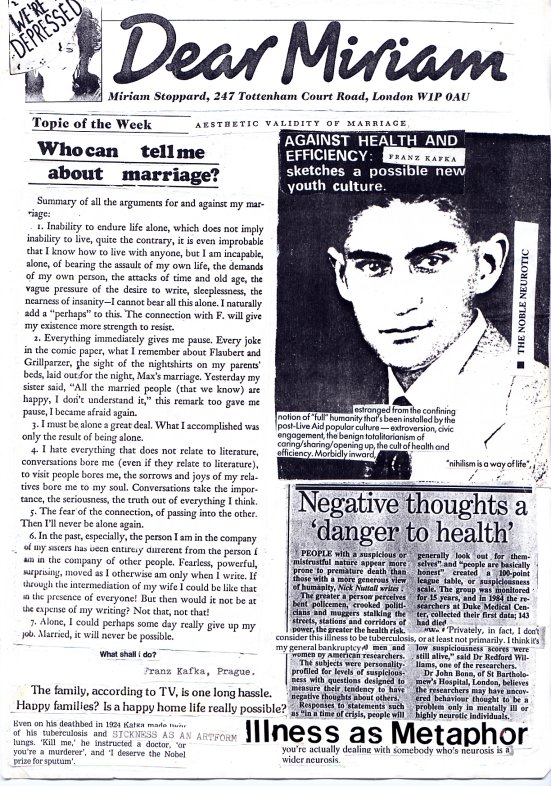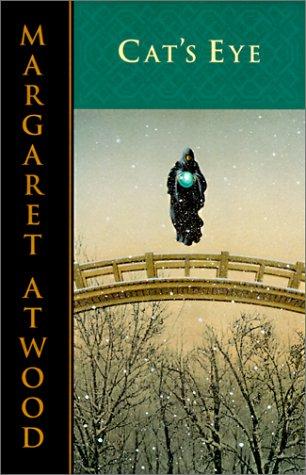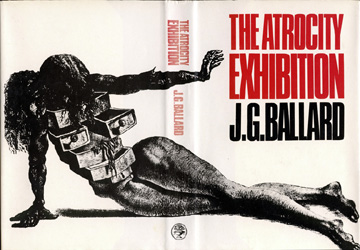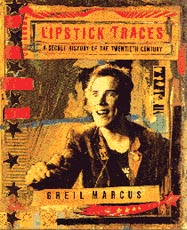June 28, 2005
Book meme
At least two people have asked me to do this, so here - at last - goes.
1) How many books do you own?
No way of knowing. Certainly can't count them and have no reliable way of calculating.
2) What was the last book you bought?
The Sex Appeal of the Inorganic, Mario Perniola. (You're sure to hear much more of this here very soon.)
3) What was the last book you read?
Read and finished: Michael Bracewell's England is Mine - disappointing and frustrating. There are flashes of insight but the organization of the book seems to change from chapter to chapter; at one moment the narrative is historical, the next it is thematic, and then regional. There is a sense of always just approaching the time when things are happening or just having missed it. Can't help thinking that Bracewell will benefit from a more focused subject matter, which is why still I'm looking forward to his Roxy book, due out later this year. (And there's way too much attention paid to Eng Lit: nothing will ever interest me in W H Boredom, for instance.)
Finishing: Houllebecq's Atmomised. No wonder Zizek likes this one. Is there a better savaging of desolate hippie hedonism and its pathetic legacy in New Age zen bullshit?
4)Five books that mean a lot to me.
(I hate all those surveys of best films/ books/ LPs which have the Latest Thing at the top, so I have only allowed myself to select books that have meant something to me for at least a decade.)

Kafka: The Trial, The Castle
Is it possible to reproduce, later in life, the impact that books, records and films have between the ages of fourteen and seventeen? The periods of my adult life that have been most miserable have been those in which I lost fidelity to what I discovered then, in the pages of Joyce, Dostoyevsky, Burroughs, Beckett, Selby... Any of those could have been selected, but I choose Kafka, because of all of them, it is he who has been the most intimate and constant companion.
I actually encountered Kafka first in a Penguin compendium of 'The Novels of Franz Kafka' that my parents, who knew very little about literature, bought me for Christmas because they 'thought it looked like my kind of thing'. So it proved.
It's difficult for me now to remember how I first received the text. Whether I initially enjoyed it or was frustrated by it I couldn't say. Kafka, after all, is a writer who doesn't waylay you. He invades subtly, slowly. I imagine that at the time I wanted and expected a more straightforward statement of existentialist alienation. Yet there was very little of that in Kafka. This was not a world of metaphysical grandstanding but a seedy, cramped burrow, whose ruling affect is not heroic alienation but creeping embarrassment. Physical force plays almost no role in Kafka's fictions - it is the ever-present possibility of social shaming that is the motive force of his winding non-plots.
Remember the pitiful scenes in The Trial when K, looking for the court in an office block, knocks in turn on each door, making the pathetic excuse that he is a 'house painter'? Kafka's genius consists in banalizing the absurdity of this: surprisingly, against all our expectations, it is indeed the case that K's hearing is taking place in one of the appartments in the building. Of course it is. And why is he late? The more absurd K thinks things are, the more embarrassed he becomes for failing to understand 'the ways' of the Court or of the Castle. The bureaucratic convolutions appear ridiculous and frustrating to him, but that is because he 'has not understood' yet. Witness the comedy of the opening scenes of The Castle, which are less an anticipation of totalitarianism than of call centres, in which K is told that the telephones 'function like musical instruments'. What kind of an idiot is he, if when he phones someone's desk, he expects them to answer? Is he so wet behind the ears?
It's not for nothing that Alan Bennett, the laureate of embarrassment, is an ardent admirer of Kafka. Both Bennett and Kafka understand that, no matter how absurd their rituals, pronunciations, clothes might appear to be, the ruling class are unembarrassable; that is not because there is a special code which only they understand - there is no code, precisely - but that whatever they do is alright, because it is THEM doing it. Conversely, if you are not of the 'in-crowd' nothing you can do could EVER be right; you are a priori guilty.
Atwood: Cat's Eye

A while back, Luke asked me what an example of 'Cold Rationalist' literature would look like. Atwood, with her reputation for coldness, is an obvious answer, but in truth, more or less all literature is cold rationalist. Why? Because it allows us to see ourselves as chains of cause and effect and thereby, paradoxically, to attain the only measure of freedom available to us. (Even Wordsworth, who admired Spinoza, described poetry as 'emotion recollected in tranquillity', i.e. not raw emotion expressed in some Dionysian ejaculation.)
Cat's Eye isn't my favourite Atwood novel - that would be the stark Surfacing - but it is the one that means most to me. I don't even remember all of the plot; what I will never forget are Atwood's horribly vivid descriptions of the the pitiless Hobbesian cruelty of teenage 'friendships'. They walk behind you so as they can criticise your shoes, the way you walk... They are worse than your worst enemies. The long days, the breakfast toast turning to cardboard in your mouth, the anxiety so sharp and constant that you forget it is there, no longer even register it.
Are your most formative years those of your early childhood or your early teens? Reading Cat's Eye in my early twenties was a kind of auto-psychoanalysis, a way out of the legacy of misanthropy, suppressed rage and cosmic sense of inadequacy that had been the legacy of my teenage years. Atwood's icy analysis beautifully demonstrated that the humiliations of those teenage years were a structural effect of teenage relationships, not at all anything specific to me.
Spinoza: The Ethics
Spinoza changes everything, but gradually. There is no 'road to Damascus' conversion to Spinozism, only a steady but implacable deletion of default assumptions. As with all the best philosophy, reading it is like running a Videodrome cassette: you think you are playing it, but it ends up playing you, effecting a gradual mutation of the way you think and perceive.
I'd been attracted to Spinoza as an undergraduate, but I only really read him at Warwick, under the influence of Deleuze. We spent over a year poring over The Ethics in a reading group. Here was a philosophy that was at once forbiddingly abstract and immediately practical, pitched at both the largest conceivable cosmic scale and the minutiae of the psyche. The 'impossible' bringing together of structural analysis and existentialism?
Ballard: The Atrocity Exhibition

If Spinoza and Kafka were slow-acting, Ballard's impact was instant. He connected immediately with an unconscious saturated in media signal.
That was partly because I had in effect encountered Ballard long before I had actually read any of his work: in Joy Division (though more in Hannett's sound than in many of the lyrics; the song 'The Atrocity Exhibition', with its anguished pleading, couldn't be further from Ballard's dispassionate sobriety); in Foxx and Ultravox, in Cabaret Voltaire, in Magazine (big k-punk post coming up on them btw).
The Drowned World is the best of his disaster novels, inundated London as a literalized Surrealist landscape coolly surveyed by a latter-day Conrad, but it is The Atrocity Exhibition that is indispensable. Much more than the better-known Crash, The Atrocity Exhibition provided a conceptual and methodological repertoire for approaching the twentieth century assembled from the century's own resources. It is austerely modernist, making little concession to either plot or character, more like a fictive sculpture than a story, an obsessively repeated series of patterns.
Yes, Ballard has been accepted into the review columns, become an elder statesman, but let's not forget how different his background was from the standard Oxbridge man of letters. Ballard rescued Britain from Eng Lit, from 'decent' humanist certainties and Sunday supplement sleepiness.
Greil Marcus: Lipstick Traces

I've written before about the importance of this book to me. I read it when I had just finished university, no plans, the future collapsing into a grim attempt - bound to fail - to commensurate myself to the Thatcherite economic reality principle. Marcus' vast web of connections opened up an escape route. It was a description of a transhistorical Event, a break-out embracing anabaptists, situationists, dadaists, surrealists, punks. Such an Event was the exact opposite of the Grand Spectacles of the eighties, the scripted and organized Non events which played out on global television with Live Aid at their epicentre. It was fugitive, secret, even when - necessarily - massively collective. Lipstick Traces was sure that pop can only have any significance when it ceases to be 'just music', when it reverberates with a politics that has nothing to do with capitalist parliamentarianism and a philosophy that has nothing to do with the academy.
Lipstick Traces is itself best read as part of a textual rhizome which attempted to register, a decade or more on, the impact of punk. See also Vague magazine (if you are looking for one of the most powerful triggers for Ccru-style cyberpunk theory, check out Mark Downham's pieces in Vague), Savage's England's Dreaming. (This set not really complete until Rip It Up of course.)
5) Tag five people.
I can't think of one other blog that hasn't done this, so I'm stuck.
Posted by mark at June 28, 2005 04:10 PM | TrackBack